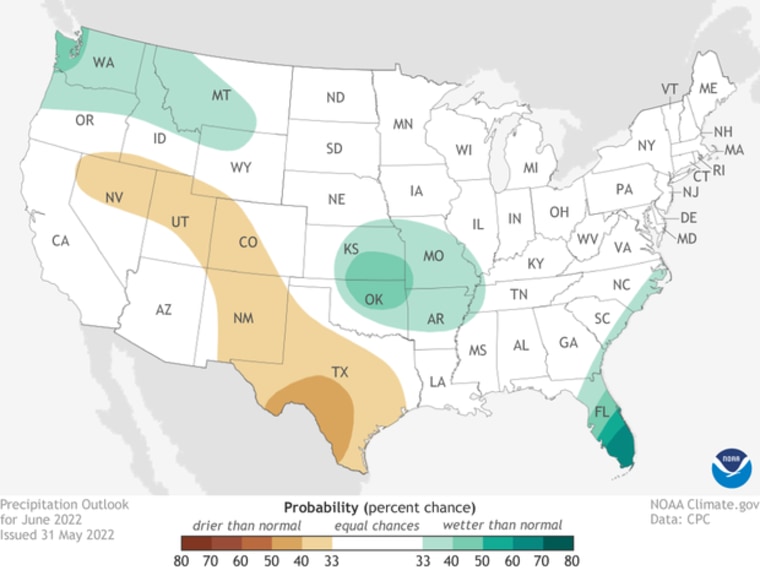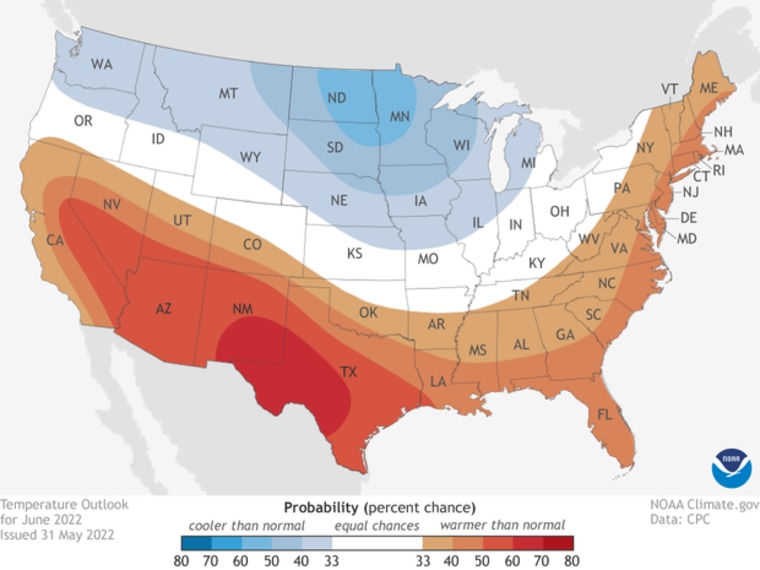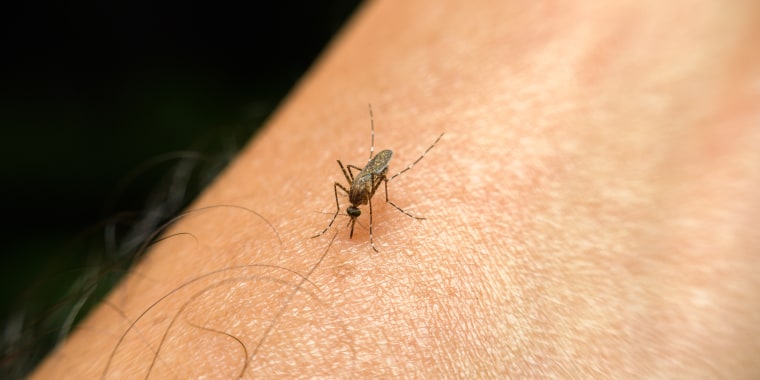With much of the country heading into a wetter and hotter than average summer, health officials are reminding the public to protect against mosquito bites.
“There are going to be lots of mosquitos in 2022 because of the increased rain and warmer weather that has given mosquitos an ideal breeding habitat,” David Beresford, Ph.D., a biologist and entomologist at Trent University, told TODAY.
Dubbed "the world’s deadliest animal" by the Centers for Disease Control and Prevention, mosquitos are responsible for causing more death and disease than any other animal worldwide. They spread a variety of viruses and parasites, such as malaria, Zika virus, dengue fever, filariasis, West Nile virus and yellow fever.
While there are thousands of species of mosquitos across the globe, only about 200 types of mosquitoes live in the continental U.S. and U.S. territories, and only 12 of them spread disease. “The rest are considered nuisance mosquitos and pose no risk at all beyond itching and irritation,” Dr. Edward Ryan, an immunologist at Harvard Medical School and director of Global Infectious Diseases at Mass General Hospital, told TODAY.
RELATED: What bit me? How to identify bug bites and stop the itch
West Nile virus is the most common mosquito-borne virus in the U.S., usually causing flu-like symptoms. “But it has known to be life-threatening in some cases" if it infects the nervous system, Ryan said. Some 2,400 people in the U.S. have died from it since it was first detected in 1999, according to Michael Joseph Raupp, Ph.D., an entomologist at the University of Maryland. The U.S. has also seen outbreaks of other mosquito-borne illnesses, such as encephalitis, chikungunya, dengue and Zika.
Mosquito-related illnesses are most common in mid-to-late July, August and September, as many mosquito-borne viruses that affect humans “spill over” from mosquitos first biting animals, Ryan said.
This year will be worse for mosquitos in some parts of the country. Here's why
Because mosquito larvae require water to develop, “the general rule is that the wetter an area is, the greater the concentration of mosquitos will be,” Ryan said.

States that will experience more rainfall than usual this summer — as projected across Washington state, Oregon, Idaho, Montana, Wyoming, Kansas, Oklahoma, Missouri, Arkansas, Florida, Georgia and the Carolinas — “will have an increased biting burden,” and may be more susceptible to mosquito-borne illnesses this summer, Ryan added.
Heat also contributes to swelling mosquito populations, as “warm temperatures allow mosquitos to develop more rapidly,” Raupp told TODAY. This year has a 99% chance of becoming one of the top 10 hottest years on record, according to the National Centers for Environmental Information.

Raupp also warned that warmer temperatures are lasting longer due to climate change, so “mosquito season starts earlier in spring and continues later in autumn, providing mosquitos with more days to bring misery and spread disease.”
When exactly mosquito season starts and ends depends on where you live, but generally speaking, it's longer in the South and Southwest and shortest in New England, the northern Midwest and Pacific Northwest, per pest control company Terminix.
How to protect yourself from mosquitos
As irritating and potentially dangerous as mosquito bites can be, they can be avoided.
“First and foremost, eliminate all breeding sites for mosquitos around the home,” Raupp advised. That means getting rid of all stagnate water that may collect in flowerpots or buckets, cleaning out clogged rain gutters and switching out water in bird baths every few days. He also suggested using a patio fan as “mosquitos have difficulty flying in breezy conditions.”
Ryan recommended hanging out in screened-in porches or adding screens to your windows, as well as limiting the hours spent outside at dusk and dawn — when mosquito activity is highest. If possible, try to encourage children to play outdoors in the afternoon, instead of the evening.
RELATED: How severe will this year’s tick season be? Here’s what to know
Mosquito repellent is important, too. You can either wash clothing in permethrin, which usually provides protection for a few weeks, or apply bug spray directly onto your skin or clothing before going outside. Beresford recommended rubbing repellent on hands, forearms, the back of the neck, ears, forehead and socks, but cautioned that only a small amount is necessary because “the smell confuses the mosquitos, and they do not bite even if they land.”
Last, take care to avoid places where disease-carrying mosquitos have been detected. For example, the CDC discourages pregnant women from traveling to areas of the world with recent Zika virus outbreaks, as the virus can cause birth defects. Check your local state department website for information on mosquito activity in your area and recommended preventive measures, Ryan advised.
“No one should panic or overreact to the health risks posed by mosquitos,” he stressed. “Usually, common sense individual controls are sufficient enough to keep any problems at bay.”

